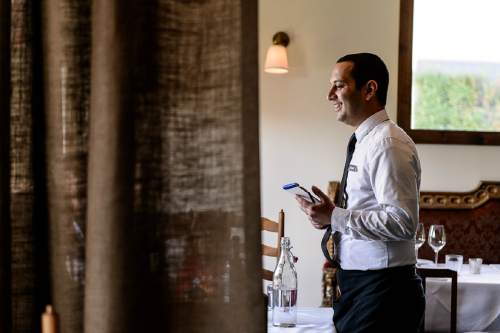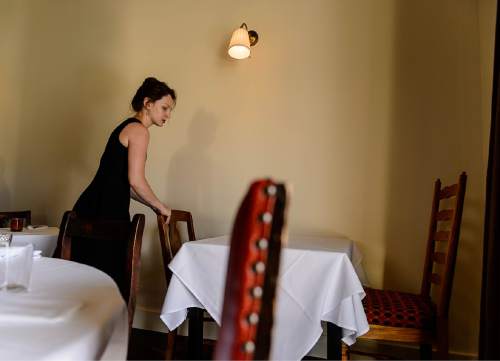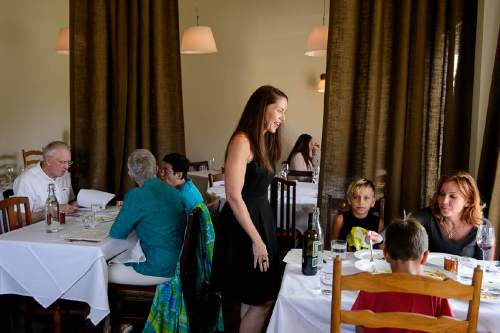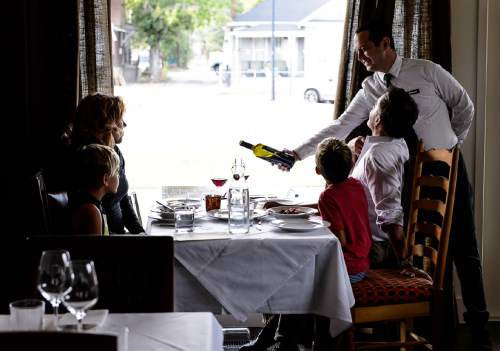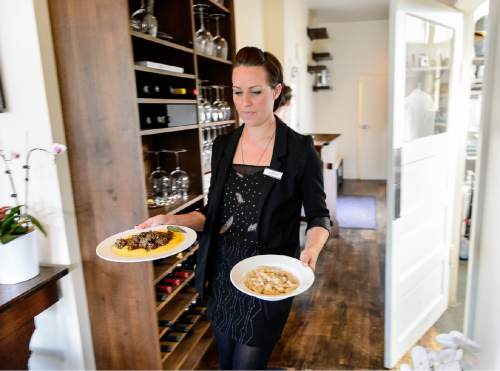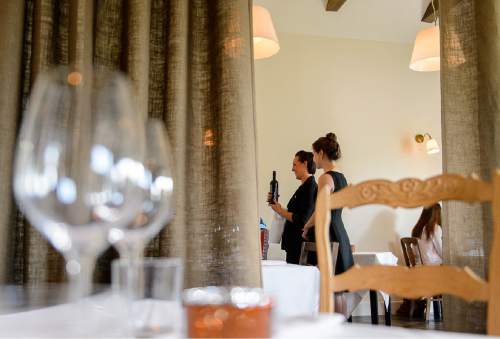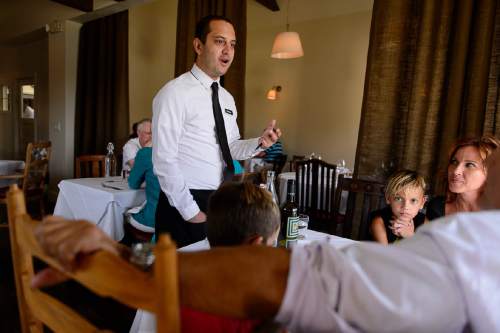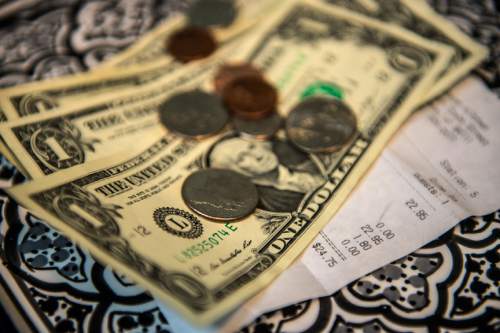This is an archived article that was published on sltrib.com in 2016, and information in the article may be outdated. It is provided only for personal research purposes and may not be reprinted.
When Marco and Amy Stevanoni decided to open Veneto Ristorante Italiano, they wanted their fine-dining restaurant to be a true representation of the region in northern Italy where Marco was born and raised.
"If we were to pick up this restaurant in Salt Lake City and drop it in Veneto, Italy, we wanted to have people love and respect it," said Amy.
That meant making the dining room feel like an extension of someone's home, with antique couches and chairs, and serving four-course meals where guests could linger over cured meats and cheeses, plates of polenta or handmade pastas like mountain gnocchi with butter and sage.
Italian tradition would also call for no tipping.
So Veneto will do the same, joining a growing number of restaurants nationwide that are eliminating tipping.
At Veneto, the owners will instead charge a "coperto" or service charge of $3 per person. The fee dates to the Middle Ages, when travelers would stop at inns to rest and get warm by a fire, but saved money by packing their own food. To recoup some of the expenses, innkeepers established the "coperto."
"The cover charge still remains in Italy," said Marco, who came to the University of Utah on a ski scholarship and met Amy, a Utah native. He said the restaurant model has helped make waiting tables a respected profession in his native country.
"It sends an important message that any job — whether baker or a banker — deserves respect," he said. "In America it is different, because the banker can drive a Porsche and a baker can't."
The Stevanonis, who opened their restaurant in July in the space formerly occupied by Forage, know of no other fine-dining restaurant in Utah that has a no-tipping policy, although the practice has become more common in other large U.S. cities.
Last October, Danny Meyer, the founder of New York City's famed Gramercy Tavern and The Modern in the Museum of Modern Art, instituted a "hospitality included" policy, basically doing away with tips at his 13 restaurants. In turn, the restaurateur raised menu prices about 20 percent, so the actual bill that customers paid remained the same.
The move helped equalize the huge wage gap that existed between the waitstaff and the cooks and dishwashers in the back of the house, where turnover is high and recruiting is tough.
After new minimum-wage laws took effect in Seattle and San Francisco last year, several restaurants in those cities announced that they, too, would eliminate tips, but raise prices so that all employees could enjoy the higher hourly wage.
The move has prompted a great tipping debate. While diners believe tipping is the way to punish poor service or reward great service, owners say in reality, most people leave the same amount no matter the type of service they receive.
And why is the waitstaff entitled to more money when it took a team of people — from prep cooks to dishwashers — to create the experience? asked Marco.
"People may not believe me, but I predict in 15 years there will be no tipping in the United States," he said. "To me it doesn't make sense."
While the salaries vary for Veneto's small staff — fewer than six — all employees make more than $16 an hour. "We take responsibility for paying a professional salary to all our staff," Marco said.
Veneto's four-course à la carte menu reflects the higher prices of its no-tipping policy, with first and main courses $18-$35; and appetizers, salads and desserts $6-$20. But the prices are comparable to other fine-dining restaurants and steak houses where salads and sides are an additional cost, said customer Andrea Morgan of Salt Lake City.
"I didn't feel like the prices were exorbitant," she said. "They kept with the experience."
A licensed clinical social worker, Morgan has traveled to Europe and was familiar with the no-tipping model. Still, she said, it's a difficult adjustment for many Americans.
"I feel this need to tip. It's kind of an anxiety-producing experience when you pay with a credit card and there's no line for a tip," she said. "But I was excited to hear that a Salt Lake City restaurant was incorporating the model."
It wasn't the consistent pay that attracted server Audrey Panhorst to apply at Veneto. After working for 15 years in the restaurant industry, she said, "I loved the idea of being a professional server and being part of a family."
When she had to call in sick a few weeks ago, she discovered the added mental benefits. "If you miss a day or a table stiffs you, you're not stressed," she said.
Ehsan Rahimzadegan, a civil engineering student at the University of Utah, has been a server for almost a decade. He said knowing the amount of his bi-weekly paycheck takes away some of the pressure associated with being a server. "You can plan your car payment and rent."
It also creates a more hospitable atmosphere for guests, he said.
"I've traveled to Italy and Spain and it's the same there. There is no need to tip because a restaurant is an extension of the owner's home and they want people to feel like a guest."
More equitable pay also encourages teamwork throughout the restaurant. "You're not just clocking in and clocking out," said Panhorst. "Everyone is jumping in to help."
Hospitality included at Veneto
Veneto Italian Ristorante specializes in the food and culture of Veneto, Italy, and is following the European tradition of no tipping. Instead, customers are charged a $3 per person "coperto" or service charge.
Where • 370 E. 900 South, Salt Lake City; 801-359-0708
Open • Monday-Saturday, 5:30 to 10:30 p.m.
Prices • À la carte menu. First and main courses $18-$35; appetizers, salads and desserts $6-$20.


